
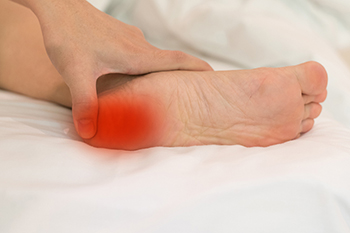
Sever’s disease, or calcaneal apophysitis, is a common cause of heel pain in growing children, typically between ages eight and 14. It occurs when the growth plate in the heel becomes inflamed due to repetitive stress. This condition is often seen in active kids participating in sports like soccer, basketball, or gymnastics, where running and jumping place pressure on the heel. The pain usually develops at the back or underside of the heel and worsens during activity. Swelling and tenderness may also be present. Diagnosing Sever’s disease involves a physical exam and ruling out other causes of heel pain. Treatment focuses on reducing inflammation and relieving discomfort. Rest, stretching exercises, and wearing supportive footwear are often recommended. If your child has persistent heel pain, it is suggested that you visit a podiatrist for a proper diagnosis and treatment, which may include orthotics.
Sever's disease often occurs in children and teens. If your child is experiencing foot or ankle pain, see Massimo Pietrantoni, DPM from Rochester Podiatry, LLP. Our doctor can treat your child’s foot and ankle needs.
Sever’s Disease
Sever’s disease is also known as calcaneal apophysitis, which is a medical condition that causes heel pain I none or both feet. The disease is known to affect children between the ages of 8 and 14.
Sever’s disease occurs when part of the child’s heel known as the growth plate (calcaneal epiphysis) is attached to the Achilles tendon. This area can suffer injury when the muscles and tendons of the growing foot do not keep pace with bone growth. Therefore, the constant pain which one experiences at the back of the heel will make the child unable to put any weight on the heel. The child is then forced to walk on their toes.
Symptoms
Acute pain – Pain associated with Sever’s disease is usually felt in the heel when the child engages in physical activity such as walking, jumping and or running.
Highly active – Children who are very active are among the most susceptible in experiencing Sever’s disease, because of the stress and tension placed on their feet.
If you have any questions, please feel free to contact one of our offices located in Brighton and Greece of Rochester, NY . We offer the newest diagnostic and treatment technologies for all your foot and ankle injuries.
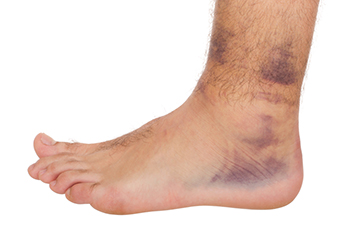
Ankle sprains occur when the ligaments surrounding the ankle are stretched or torn. The two primary types of ankle sprains are inversion and eversion sprains. An inversion sprain happens when the foot turns inward, causing damage to the ligaments on the outside of the ankle. This is the most common type of ankle sprain. An eversion sprain occurs when the foot turns outward, injuring the ligaments on the inside of the ankle. Symptoms of both types include pain, swelling, bruising, and difficulty walking. Inversion sprains are often caused by rolling the ankle during sports or physical activity, while eversion sprains can result from a misstep or uneven surface. If you have sprained your ankle, it is suggested that you promptly consult a podiatrist who can offer you effective relief and treatment solutions.
Although ankle sprains are common, they aren’t always minor injuries. If you need your ankle injury looked at, contact Massimo Pietrantoni, DPM from Rochester Podiatry, LLP. Our doctor can provide the care you need to keep you pain-free and on your feet.
How Does an Ankle Sprain Occur?
Ankle sprains are the result of a tear in the ligaments within the ankle. These injuries may happen when you make a rapid shifting movement while your foot is planted. A less common way to sprain your ankle is when your ankle rolls inward while your foot turns outward.
What Are the Symptoms?
Preventing a Sprain
Treatment of a Sprain
In many cases, the RICE method (Rest, Ice, Compression, and Elevate) is used to treat ankle sprains. However, you should see a podiatrist to see which treatment option would work best with your injury. In severe cases, surgery may be required.
It is important to ask your doctor about rehab options after you receive treatment for your injury. Stretching, strength training, and balance exercises may help the ankle heal while also preventing further injury.
If you have any questions, please feel free to contact one of our offices located in Brighton and Greece of Rochester, NY . We offer the newest diagnostic and treatment technologies for all your foot care needs.
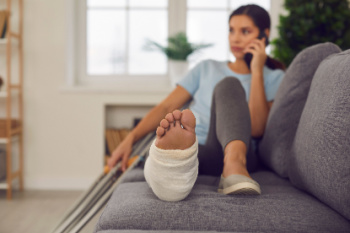
A broken ankle can cause immediate and severe pain, along with visible bruising, swelling, and sometimes joint deformity. In some cases, the ankle may appear misshapen or out of alignment, and you may be unable to bear weight on the injured foot. The most common causes of a broken ankle include falls, sports injuries, or accidents that involve twisting or rolling the ankle. Treatment for a broken ankle typically includes elevation along with immobilization, using a cast or brace. If the fracture is more severe or displaced, surgery may be needed to realign the bones and secure them with pins, plates, or screws. Proper diagnosis and treatment are key to ensure the ankle heals correctly and to prevent long-term complications like instability or arthritis. Visiting a podiatrist can help you get the right care. If you suspect you have broken your ankle, it is suggested that you make an emergency appointment with a podiatrist.
Broken ankles need immediate treatment. If you are seeking treatment, contact Massimo Pietrantoni, DPM from Rochester Podiatry, LLP. Our doctor can provide the care you need to keep you pain-free and on your feet.
Broken Ankles
A broken ankle is experienced when a person fractures their tibia or fibula in the lower leg and ankle area. Both of these bones are attached at the bottom of the leg and combine to form what we know to be our ankle.
When a physician is referring to a break of the ankle, he or she is usually referring to a break in the area where the tibia and fibula are joined to create our ankle joint. Ankles are more prone to fractures because the ankle is an area that suffers a lot of pressure and stress. There are some obvious signs when a person experiences a fractured ankle, and the following symptoms may be present.
Symptoms of a Fractured Ankle
If you suspect an ankle fracture, it is recommended to seek treatment as soon as possible. The sooner you have your podiatrist diagnose the fracture, the quicker you’ll be on the way towards recovery.
If you have any questions, please feel free to contact one of our offices located in Brighton and Greece of Rochester, NY . We offer the newest diagnostic and treatment technologies for all your foot care needs.
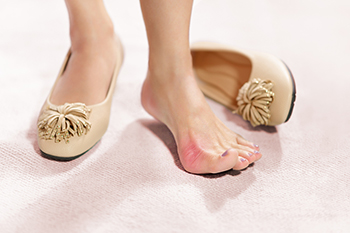
A bunion is a bony bump that forms at the base of the big toe, where it angles toward the second toe. This condition occurs when the bones in the front of the foot shift out of alignment, causing the big toe to lean inward. Over time, the misalignment leads to the formation of a prominent bump on the joint. Symptoms of bunions include pain, swelling, redness, and the development of calluses or corns where the toes rub against the shoe. The pain can worsen with prolonged standing or walking. Common causes of bunions include genetics, wearing tight or ill-fitting shoes, and excessive pressure on the feet. Conditions like arthritis or flat feet can also contribute to the development of bunions. While bunions may be managed with conservative treatments, surgery may be needed for severe cases to restore normal foot function and alleviate pain. If you have symptoms of a bunion, it is suggested that you consult a podiatrist who can guide you toward treatment methods that are right for you.
If you are suffering from bunions, contact Massimo Pietrantoni, DPM of Rochester Podiatry, LLP. Our doctor can provide the care you need to keep you pain-free and on your feet.
What Is a Bunion?
A bunion is formed of swollen tissue or an enlargement of boney growth, usually located at the base joint of the toe that connects to the foot. The swelling occurs due to the bones in the big toe shifting inward, which impacts the other toes of the foot. This causes the area around the base of the big toe to become inflamed and painful.
Why Do Bunions Form?
Genetics – Susceptibility to bunions are often hereditary
Stress on the feet – Poorly fitted and uncomfortable footwear that places stress on feet, such as heels, can worsen existing bunions
How Are Bunions Diagnosed?
Doctors often perform two tests – blood tests and x-rays – when trying to diagnose bunions, especially in the early stages of development. Blood tests help determine if the foot pain is being caused by something else, such as arthritis, while x-rays provide a clear picture of your bone structure to your doctor.
How Are Bunions Treated?
If you have any questions, please feel free to contact one of our offices located in Brighton and Greece of Rochester, NY . We offer the newest diagnostic and treatment technologies for all your foot care needs.
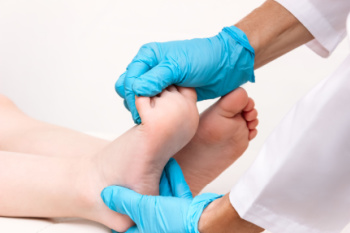
Cracked skin on the soles of children's feet is often due to dryness, frequent barefoot activity, or wearing shoes that do not provide enough support. One common condition linked to cracked soles in kids is juvenile plantar dermatosis, which causes dry, cracked, and sometimes painful skin on the balls of the feet and heels. This condition is often worsened by alternating between damp, sweaty, and dry conditions, like going from sweaty shoes to bare feet. To treat cracked soles, keep the skin moisturized with a gentle, fragrance-free cream, and ensure children wear breathable socks and properly fitting shoes to protect their feet. If cracks are deep, painful, or show signs of infection, it is suggested that you consult a podiatrist who can tailor treatment and guidance for your child to promote healing and comfort.
If the skin on your feet starts to crack, you may want to see a podiatrist to find treatment. If you have any concerns, contact Massimo Pietrantoni, DPM from Rochester Podiatry, LLP. Our doctor can provide the care you need to keep you pain-free and on your feet.
Cracked Heels
It is important to moisturize your cracked heels in order to prevent pain, bleeding, and infection. The reason cracked heels form is because the skin on the foot is too dry to support the immense pressure placed on them. When the foot expands, the dry skin on the foot begins to split.
Ways to Help Heal Them
Ways to Prevent Cracked Heels
If you are unsure how to proceed in treating cracked heels, seek guidance from a podiatrist. Your doctor will help you with any questions or information you may need.
If you have any questions, please feel free to contact one of our offices located in Brighton and Greece of Rochester, NY . We offer the newest diagnostic and treatment technologies for all your foot care needs.